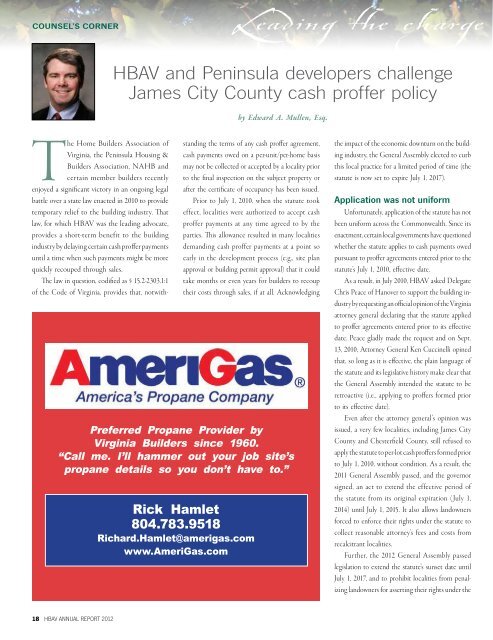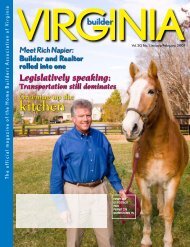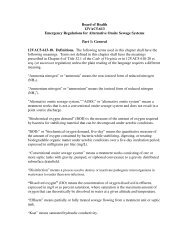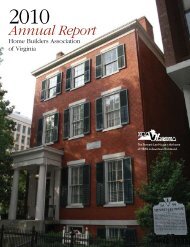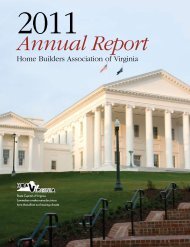to view - Home Builders Association of Virginia
to view - Home Builders Association of Virginia
to view - Home Builders Association of Virginia
Create successful ePaper yourself
Turn your PDF publications into a flip-book with our unique Google optimized e-Paper software.
CounseL’s Corner<br />
The <strong>Home</strong> <strong>Builders</strong> <strong>Association</strong> <strong>of</strong><br />
<strong>Virginia</strong>, the Peninsula Housing &<br />
<strong>Builders</strong> <strong>Association</strong>, NAHB and<br />
certain member builders recently<br />
enjoyed a significant vic<strong>to</strong>ry in an ongoing legal<br />
battle over a state law enacted in 2010 <strong>to</strong> provide<br />
temporary relief <strong>to</strong> the building industry. That<br />
law, for which HBAV was the leading advocate,<br />
provides a short-term benefit <strong>to</strong> the building<br />
industry by delaying certain cash pr<strong>of</strong>fer payments<br />
until a time when such payments might be more<br />
quickly recouped through sales.<br />
The law in question, codified as § 15.2-2303.1:1<br />
<strong>of</strong> the Code <strong>of</strong> <strong>Virginia</strong>, provides that, notwith-<br />
18 HBaV annual RepoRt 2012<br />
Leading the charge<br />
HBaV and peninsula developers challenge<br />
James City County cash pr<strong>of</strong>fer policy<br />
by Edward A. Mullen, Esq.<br />
standing the terms <strong>of</strong> any cash pr<strong>of</strong>fer agreement,<br />
cash payments owed on a per-unit/per-home basis<br />
may not be collected or accepted by a locality prior<br />
<strong>to</strong> the final inspection on the subject property or<br />
after the certificate <strong>of</strong> occupancy has been issued.<br />
Prior <strong>to</strong> July 1, 2010, when the statute <strong>to</strong>ok<br />
effect, localities were authorized <strong>to</strong> accept cash<br />
pr<strong>of</strong>fer payments at any time agreed <strong>to</strong> by the<br />
parties. This allowance resulted in many localities<br />
demanding cash pr<strong>of</strong>fer payments at a point so<br />
early in the development process (e.g., site plan<br />
approval or building permit approval) that it could<br />
take months or even years for builders <strong>to</strong> recoup<br />
their costs through sales, if at all. Acknowledging<br />
Preferred Propane Provider by<br />
<strong>Virginia</strong> <strong>Builders</strong> since 1960.<br />
“Call me. I’ll hammer out your job site’s<br />
propane details so you don’t have <strong>to</strong>.”<br />
Rick Hamlet<br />
804.783.9518<br />
Richard.Hamlet@amerigas.com<br />
www.AmeriGas.com<br />
the impact <strong>of</strong> the economic downturn on the building<br />
industry, the General Assembly elected <strong>to</strong> curb<br />
this local practice for a limited period <strong>of</strong> time (the<br />
statute is now set <strong>to</strong> expire July 1, 2017).<br />
Application was not uniform<br />
Unfortunately, application <strong>of</strong> the statute has not<br />
been uniform across the Commonwealth. Since its<br />
enactment, certain local governments have questioned<br />
whether the statute applies <strong>to</strong> cash payments owed<br />
pursuant <strong>to</strong> pr<strong>of</strong>fer agreements entered prior <strong>to</strong> the<br />
statute’s July 1, 2010, effective date.<br />
As a result, in July 2010, HBAV asked Delegate<br />
Chris Peace <strong>of</strong> Hanover <strong>to</strong> support the building industry<br />
by requesting an <strong>of</strong>ficial opinion <strong>of</strong> the <strong>Virginia</strong><br />
at<strong>to</strong>rney general declaring that the statute applied<br />
<strong>to</strong> pr<strong>of</strong>fer agreements entered prior <strong>to</strong> its effective<br />
date. Peace gladly made the request and on Sept.<br />
13, 2010, At<strong>to</strong>rney General Ken Cuccinelli opined<br />
that, so long as it is effective, the plain language <strong>of</strong><br />
the statute and its legislative his<strong>to</strong>ry make clear that<br />
the General Assembly intended the statute <strong>to</strong> be<br />
retroactive (i.e., applying <strong>to</strong> pr<strong>of</strong>fers formed prior<br />
<strong>to</strong> its effective date).<br />
Even after the at<strong>to</strong>rney general’s opinion was<br />
issued, a very few localities, including James City<br />
County and Chesterfield County, still refused <strong>to</strong><br />
apply the statute <strong>to</strong> per-lot cash pr<strong>of</strong>fers formed prior<br />
<strong>to</strong> July 1, 2010, without condition. As a result, the<br />
2011 General Assembly passed, and the governor<br />
signed, an act <strong>to</strong> extend the effective period <strong>of</strong><br />
the statute from its original expiration (July 1,<br />
2014) until July 1, 2015. It also allows landowners<br />
forced <strong>to</strong> enforce their rights under the statute <strong>to</strong><br />
collect reasonable at<strong>to</strong>rney’s fees and costs from<br />
recalcitrant localities.<br />
Further, the 2012 General Assembly passed<br />
legislation <strong>to</strong> extend the statute’s sunset date until<br />
July 1, 2017, and <strong>to</strong> prohibit localities from penalizing<br />
landowners for asserting their rights under the


